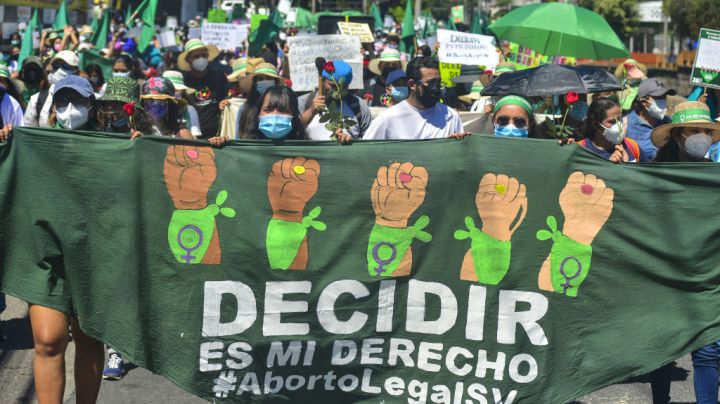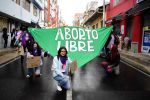Woman in El Salvador Sentenced to 30 Years in Jail for Miscarriage

SAN SALVADOR, EL SALVADOR - SEPTEMBER 28: Women hold signs and chant slogans as they march to the Legislative Assembly during a demonstration to demand legal abortion on September 28, 2021 in San Salvador, El Salvador. President of El Salvador, Nayib Bukele, withdrew from the constitutional reform proposal, drawn up by his government, legalizing therapeutic abortion and same-sex marriage. (Photo by Roque Alvarenga/APHOTOGRAFIA/Getty Images)
There are two sides to every coin, and even as most of Latin America is moving towards decriminalizing abortion, some countries still maintain the harshest anti-abortion laws in the world, laws whose interpretation is, in many cases, anti-women. There’s no other way to qualify the news coming out of El Salvador, where a court has just sentenced a woman who suffered a miscarriage to 30 years in prison for aggravated homicide.
News of the conviction came on Monday after the woman, identified only as “Esme,” spent two years under pre-trial detention following her arrest. The laws against abortion in El Salvador are some of the strictest in the world, with a total ban on the procedure, which even includes cases of rape, incest, or medical emergencies which put the life of the mother or child at risk.
According to activists in the country 180 women have been jailed for murder for miscarriages in the past two decades, though at least eight women serving prison sentences in those cases have had their cases commuted since December.
The case presents a window into a world post Roe v. Wade for the United States, and the consequences of the draconian attempt to control women’s bodies. El Salvador is the exception in Latin America, and the world, but increasingly stricter laws make a future where women are only valued for the children they can bear – and inherently less valuable than them, once they are pregnant – possible.

Women’s reproductive rights are human rights, and the extent to which they are recognized shouldn’t rest on religion, or the opinions of men. Equality in many ways is a long way off, but it never feels quite as unachievable as right now, as we are faced with the reality that, in many places – perhaps soon in the United States too – women (and those who can get pregnant because transgender people are part of this) can’t even decide what happens to their own bodies.